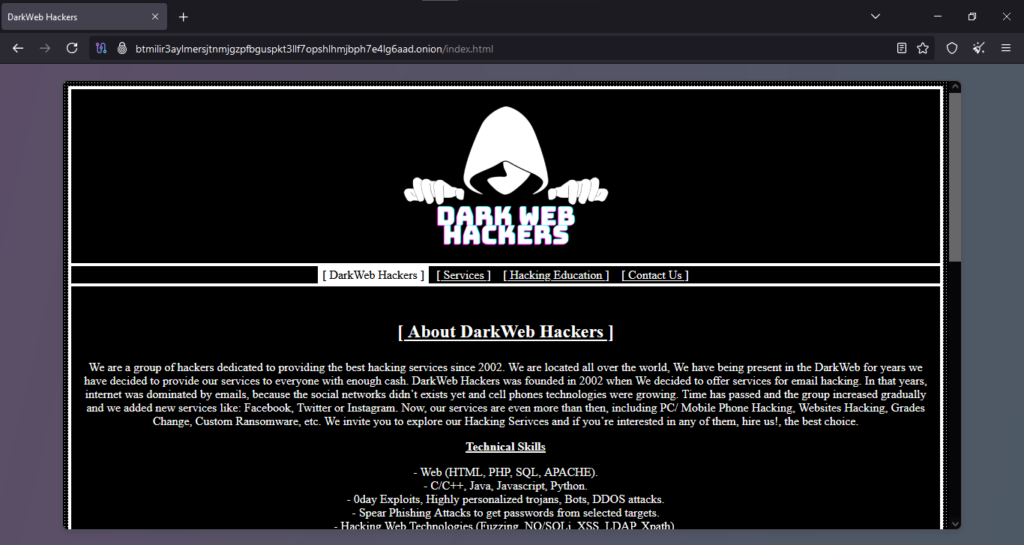Table of Contents
ToggleDark Web Hackers – TOR Scam Report (71)
Onion Link : http://btmilir3aylmersjtnmjgzpfbguspkt3llf7opshlhmjbph7e4lg6aad.onion/index.html
Scam Report Date : 2024-11-18
Client Scam Report Breakdown
Original Scam Report :
The client submitted a report detailing their negative experience with a fraudulent service. This report outlines a common scam involving hacking services advertised online, often targeting unsuspecting users who engage with illicit marketplaces. The individual’s grievance revolves around a failure to deliver the promised service after a cryptocurrency payment was made. This lack of fulfillment, coupled with unresponsiveness from the service provider, suggests a classic bait-and-switch scam.
The client’s experience highlights key aspects of these scams: an initial promise of illegal services, payment required upfront via a non-reversible method (e.g., Bitcoin), and subsequent communication cessation. While the client was attempting to procure a service deemed illegal, their report underscores the inherent risk in dealing with anonymous online vendors.
2. Defining Key Terminology and Terms
To provide clarity, it is essential to define certain terms mentioned or implied in the original report:
- Hacking Services: Refers to the unauthorized intrusion into or manipulation of digital systems, devices, or accounts. The request to hack an iPhone indicates an intention to bypass security protocols, likely for personal or investigative purposes.
- Bitcoin (BTC): A decentralized cryptocurrency commonly used in transactions on the dark web. Its pseudonymous nature makes it difficult to trace, rendering it a preferred payment method for illicit activities.
- Bait-and-Switch Scam: A fraudulent tactic where a vendor lures a customer with promises of a product or service but fails to deliver after receiving payment.
- Unresponsive Vendor: A hallmark of many online scams, where the scammer ceases all communication after payment has been made, leaving the victim without recourse.
The above terms are pivotal in understanding the dynamics of this scam. The use of Bitcoin signifies premeditated intent to exploit the irreversible nature of cryptocurrency payments, ensuring the scammer retains the funds without accountability. Similarly, the concept of hacking services reflects a morally and legally questionable transaction, inherently heightening the risks for the client.
3. Analysis and Broader Implications
This report sheds light on a pervasive issue within illicit online marketplaces: the exploitation of trust and the inherent anonymity of digital payment systems. Scams like these often prey on individuals seeking illegal or gray-area services, leveraging the absence of legal recourse to carry out fraud.
The client’s repeated requests for updates suggest a level of desperation or urgency, which scammers often exploit to delay the realization of fraud. Additionally, the reliance on Bitcoin for payment not only obscures the identity of the scammer but also eliminates any possibility of chargebacks, creating a one-sided transaction heavily skewed in the scammer’s favor.
The broader takeaway from this report is a reminder of the inherent risks associated with engaging in illegal activities online. While the client’s grievance is valid, it also serves as a cautionary tale: participating in dark web transactions often leaves users vulnerable to scams, with no legal protections to fall back on. Ultimately, this case emphasizes the need for awareness, vigilance, and a critical evaluation of risks in online interactions, especially when anonymity and irreversible payments are involved.






